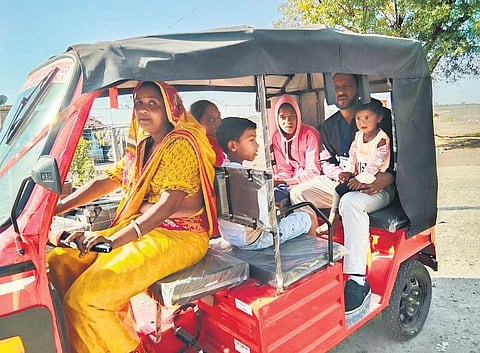

MADHYA PRADESH: The country’s 73rd Republic Day marked a new beginning in Madhya Pradesh’s Mandsaur district: e-rickshaws rolled out as public transport. Driving these vehicles are 10 young women, mostly belonging to the Banchhada tribe — who are stigmatised for pushing their daughters into prostitution.
This bunch of 10 includes Nirmala Dhangar, who will no longer have to work as agricultural labourer to help her farmer-husband earn a living.
“Since January 27, I have stopped working in the agricultural fields of the big farmers. I am earning Rs 150-400 daily these days by ferrying passengers on a route of around 15-30 km. I will now be more comfortable in funding the education of my lone son, who is in lower KG in an English medium school,” says Nirmala.
A Class V dropout, Nirmala is not the only one of her kind among the Banchhada tribe women. Parvati Bai Dahima, a Class X dropout and mother of four, too, ferries passengers across the west MP district.
“Though I earn around Rs 5,500 monthly by working as a counselor at a de-addiction centre, I also have to work as a part-time driver for private parties to support my family. The e-rickshaw has been a kind of a blessing. My wife is earning Rs 300-500 a day driving it,” says Parvati’s husband Bunty Dahima.
Also among these women is a graduate in Arts, Anjali Chouhan (also from the Banchhada tribe), who is preparing for government recruitment tests.
“Most of my passengers are women, particularly school and college girls from rural areas. They feel safer travelling in a vehicle driven by a woman. The popularity of our e-rickshaws has hurt the business of local private bus operators, some of whom tried to trouble us for snatching away their share of daily passengers. But the transport and police department came to our help,” says Anjali.
These women are also turning out to be role models for the Banchhada tribe. “Seeing the success of my wife with the e-rickshaw, many women pushed by their parents into prostitution have been calling me to help them,” said Parvati’s husband Bunty.
Suresh Charleton, the state spokesperson for the Mumbai-based non-profit organisation Bombay Teen Challenge (BTC), says the objective is to rescue and take care of individuals who have been trafficked/pushed into sexual slavery/prostitution. “We have been working with the Banchhada tribe in 10-12 villages of Mandsaur and Neemuch districts for a few years. A school and hostel have been set up for the tribe’s children in Panpur village of Mandsaur district,” says Charleton.
In association with the local administration, BTC is working to launch mobile health check-up camps and sexually transmitted diseases (STD) clinics for taking care of the needs of the Banchhada community.
This Republic Day, minister in-charge for Mandsaur district, Rajvardhan Singh Dattigaon handed over the keys of the e-rickshaws to the 10 women. “This is a unique project through which we want to inspire other women from their community to come into the mainstream and lead a respectable life,” the minister said.
Mandsaur district collector Gautam Singh said while the NGO provided the e-rickshaws, local police gave training to these women. “This project will certainly become more popular, as women drivers are more disciplined. We hope that these 10 women would inspire more people from their community to come forward and take advantage of other self-employment schemes,” Singh said.